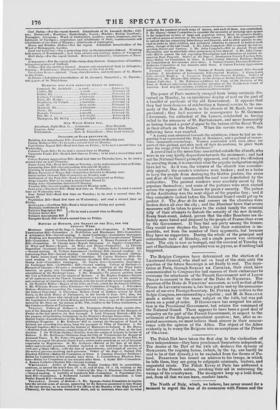The peace of Paris narrowly escaped from being seriously dis-
turbed on Monday, by an injudicious display of zeal on the part of a handful of partisans of the old Government. It appears that they had been desirous of celebrating a funeral-service to the me- mory of the Due de BERRI, in the church of St. Roch, but were prevented ; they had recourse in consequence to St. Germain l'A uxerrais, the cathedral of the Louvre, celebrated as having tolled to the massacre of St. Bartholomew, and more honourably as having formed a point dappui to the heroes of the Great Week in their attack on the Palace. When the service was over, the following three was enacted. "A young man advanced towards the catafalque, where he laid an en- graving that represented the Duke of Bordeaux, and a garland of immor- blies ("amaranth everlasting). Women contended with each other for parts of this garland, and men took off their decorations, to place them near the image of the Duke of Bordeaux." A crowd had in the mean time assembled outside the church, who were in no very kindly disposition towards the mummers ; and had not the National Guard promptly appeared, and saved the offenders by arresting them, it is uncertain what the popular indignation might have led to. As it was, the interior of the church was consider- ably injured ; the curate's windows were broken ; and as a bribe to Keep the people from destroying the Gothic portico, the cross and fieur de us that surmounted the roof were demolished by the authorities. The painted windows were carefully saved by the populace themselves ; and some of the pictures were even carried across the square of the Louvre for greater security. The palace of the Archbishop was the next object of the popular fury ; and it they completely sacked before the National Guard could get up to protect it. The jleur de us and crosses on the churches were broken down all over the city ; and the lifoniteur hints that severe measures will be taken to prove to the exiled family the criminal folly of their attempts to disturb the security of the new dynasty. Every fresh event, indeed, proves that the elder Bourbons are in- finitely more hated and despised by the people of France than even by the Government. If they had any party among the former, they would soon displace the latter; but their restoration is im- possible, not from the number of their opponents, but because they have no supporters. During the whole of the principal and subordinate riots of Monday, not a single person was seriously hurt. The city is now as tranquil, and the carnival of Tuesday (a sort of Bartholomew-fair spectacle) was as joyous, as if nothing had happened.


























 Previous page
Previous page